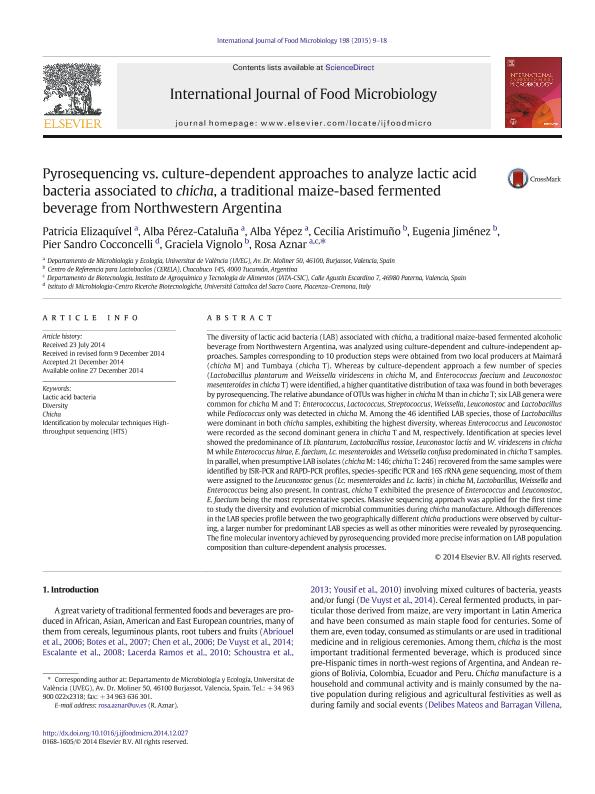Mostrar el registro sencillo del ítem
dc.contributor.author
Elizaquível, Patricia
dc.contributor.author
Perez Cataluña, Alba
dc.contributor.author
Yepes, Alba
dc.contributor.author
Aristimuño Ficoseco, Maria Cecilia

dc.contributor.author
Jimenez, María Eugenia

dc.contributor.author
Cocconcelli, Pier Sandro
dc.contributor.author
Vignolo, Graciela Margarita

dc.contributor.author
Aznar, Rosa
dc.date.available
2017-11-16T19:57:54Z
dc.date.issued
2015-01-02
dc.identifier.citation
Elizaquível, Patricia; Perez Cataluña, Alba; Yepes, Alba; Aristimuño Ficoseco, Maria Cecilia; Jimenez, María Eugenia; et al.; Pyrosequencing vs. culture-dependent approaches to analyze lactic acid bacteria associated to chicha, a traditional maize-based fermented beverage from Northwestern Argentina; Elsevier Science; International Journal of Food Microbiology; 198; 2-1-2015; 9-18
dc.identifier.issn
0168-1605
dc.identifier.uri
http://hdl.handle.net/11336/28373
dc.description.abstract
The diversity of lactic acid bacteria (LAB) associated with chicha, a traditional maize-based fermented alcoholicbeverage from Northwestern Argentina, was analyzed using culture-dependent and culture-independent approaches.Samples corresponding to 10 production steps were obtained from two local producers at Maimará(chicha M) and Tumbaya (chicha T). Whereas by culture-dependent approach a few number of species(Lactobacillus plantarum and Weissella viridescens in chicha M, and Enterococcus faecium and Leuconostocmesenteroides in chicha T) were identified, a higher quantitative distribution of taxa was found in both beveragesby pyrosequencing. The relative abundance of OTUs was higher in chicha M than in chicha T; six LAB genera werecommon for chicha M and T: Enterococcus, Lactococcus, Streptococcus, Weissella, Leuconostoc and Lactobacilluswhile Pediococcus only was detected in chicha M. Among the 46 identified LAB species, those of Lactobacilluswere dominant in both chicha samples, exhibiting the highest diversity, whereas Enterococcus and Leuconostocwere recorded as the second dominant genera in chicha T and M, respectively. Identification at species levelshowed the predominance of Lb. plantarum, Lactobacillus rossiae, Leuconostoc lactis and W. viridescens in chichaM while Enterococcus hirae, E. faecium, Lc. mesenteroides and Weissella confusa predominated in chicha T samples.In parallel, when presumptive LAB isolates (chicha M: 146; chicha T: 246) recovered from the same samples wereidentified by ISR-PCR and RAPD-PCR profiles, species-specific PCR and 16S rRNA gene sequencing, most of themwere assigned to the Leuconostoc genus (Lc. mesenteroides and Lc. lactis) in chicha M, Lactobacillus, Weissella andEnterococcus being also present. In contrast, chicha T exhibited the presence of Enterococcus and Leuconostoc,E. faecium being the most representative species. Massive sequencing approach was applied for the first timeto study the diversity and evolution of microbial communities during chicha manufacture. Although differencesin the LAB species profile between the two geographically different chicha productions were observed by culturing,a larger number for predominant LAB species as well as other minorities were revealed by pyrosequencing.The fine molecular inventory achieved by pyrosequencing provided more precise information on LAB populationcomposition than culture-dependent analysis processes.
dc.format
application/pdf
dc.language.iso
eng
dc.publisher
Elsevier Science

dc.rights
info:eu-repo/semantics/openAccess
dc.rights.uri
https://creativecommons.org/licenses/by-nc-sa/2.5/ar/
dc.subject
Lactic Acid Bacteria
dc.subject
Diversity
dc.subject
Chicha
dc.subject
Isr, Rapd Profiles
dc.subject
16s Rrna Sequencing
dc.subject
High-Troughput Sequencing (Hts)
dc.subject
Pyrosequencing
dc.subject.classification
Otras Ciencias Biológicas

dc.subject.classification
Ciencias Biológicas

dc.subject.classification
CIENCIAS NATURALES Y EXACTAS

dc.title
Pyrosequencing vs. culture-dependent approaches to analyze lactic acid bacteria associated to chicha, a traditional maize-based fermented beverage from Northwestern Argentina
dc.type
info:eu-repo/semantics/article
dc.type
info:ar-repo/semantics/artículo
dc.type
info:eu-repo/semantics/publishedVersion
dc.date.updated
2017-07-04T14:09:25Z
dc.identifier.eissn
1879-3460
dc.journal.volume
198
dc.journal.pagination
9-18
dc.journal.pais
Países Bajos

dc.journal.ciudad
Amsterdam
dc.description.fil
Fil: Elizaquível, Patricia. Universidad de Valencia; España
dc.description.fil
Fil: Perez Cataluña, Alba. Universidad de Valencia; España
dc.description.fil
Fil: Yepes, Alba. Universidad de Valencia; España
dc.description.fil
Fil: Aristimuño Ficoseco, Maria Cecilia. Consejo Nacional de Investigaciones Científicas y Técnicas. Centro Científico Tecnológico Conicet - Tucuman. Centro de Referencia Para Lactobacilos; Argentina
dc.description.fil
Fil: Jimenez, María Eugenia. Consejo Nacional de Investigaciones Científicas y Técnicas. Centro Científico Tecnológico Conicet - Tucuman. Centro de Referencia Para Lactobacilos; Argentina. Universidad de Valencia; España
dc.description.fil
Fil: Cocconcelli, Pier Sandro. Universita Cattolica del Sacro Cuore; Italia
dc.description.fil
Fil: Vignolo, Graciela Margarita. Consejo Nacional de Investigaciones Científicas y Técnicas. Centro Científico Tecnológico Conicet - Tucuman. Centro de Referencia Para Lactobacilos; Argentina
dc.description.fil
Fil: Aznar, Rosa. Universidad de Valencia; España
dc.journal.title
International Journal of Food Microbiology

dc.relation.alternativeid
info:eu-repo/semantics/altIdentifier/doi/http://dx.doi.org/10.1016/j.ijfoodmicro.2014.12.027
dc.relation.alternativeid
info:eu-repo/semantics/altIdentifier/url/http://www.sciencedirect.com/science/article/pii/S0168160514006333
Archivos asociados
